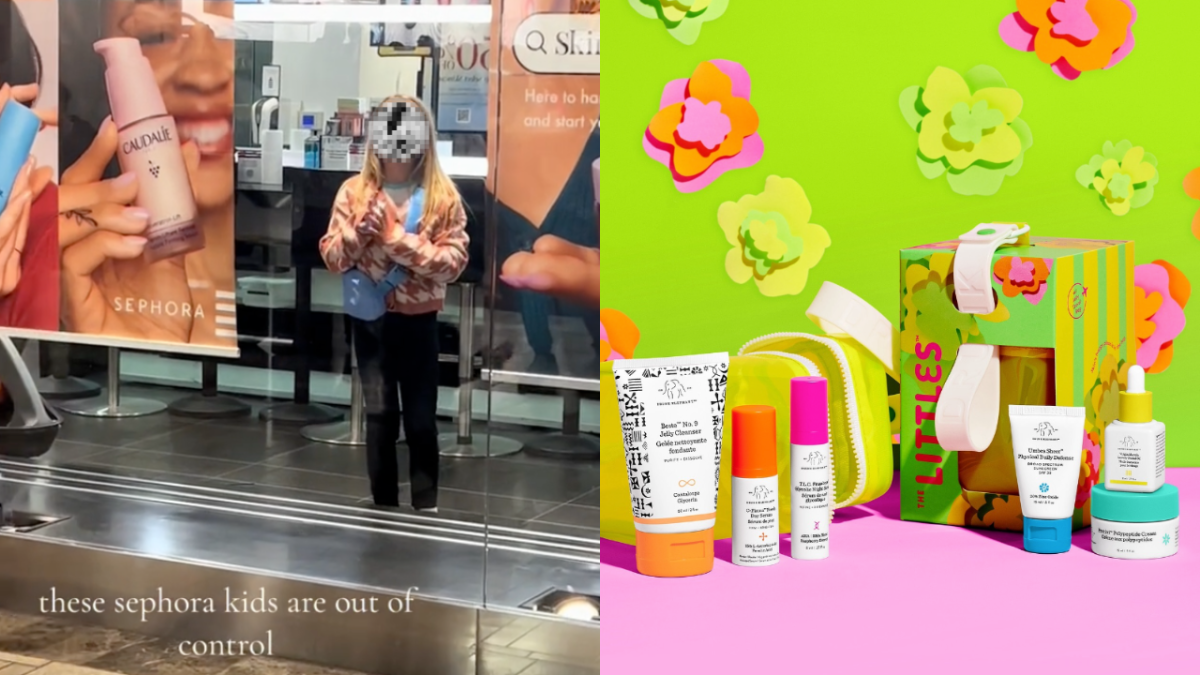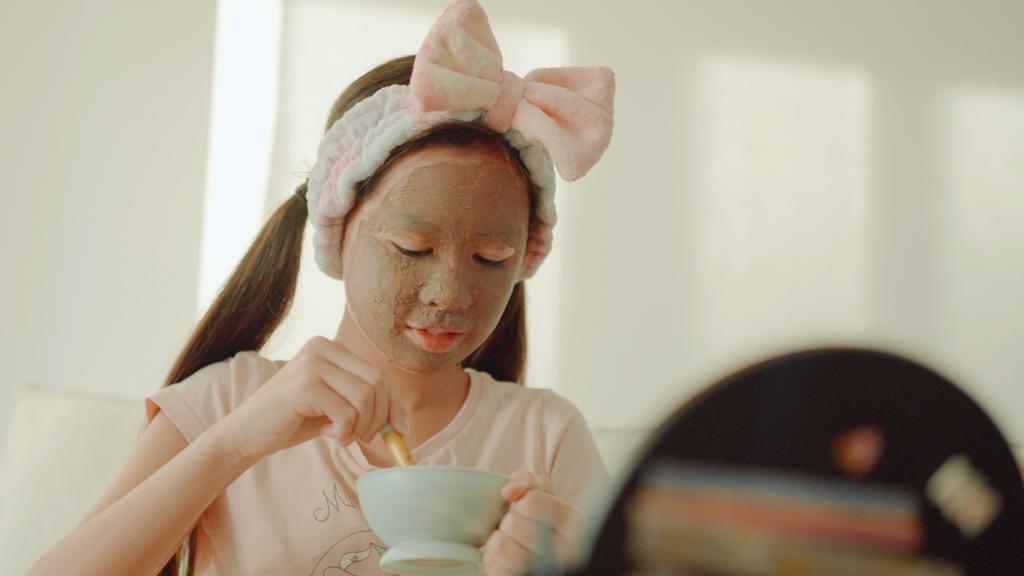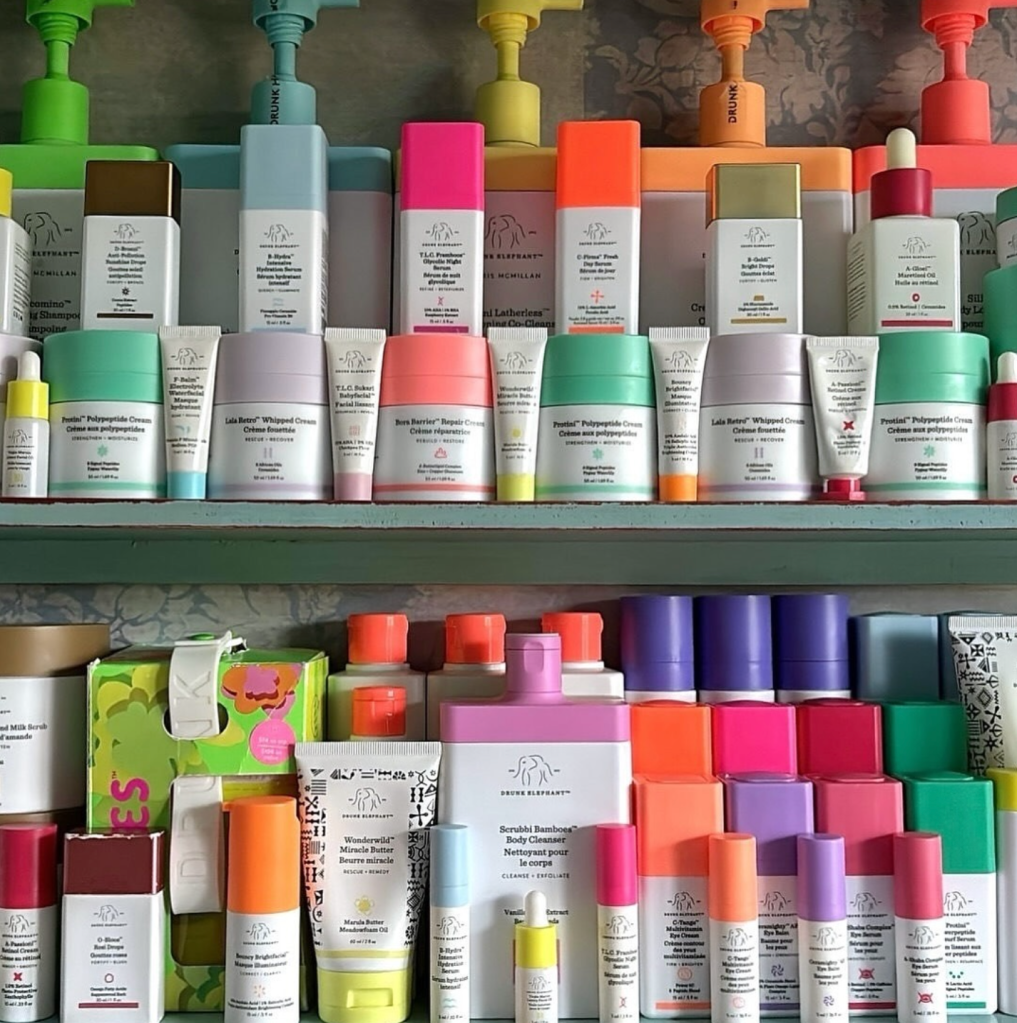
Thanks to the power of influencers, social media and over-hyped product drops, skincare and anti-ageing has become an even more lucrative goldmine for the beauty industry than it already was. But concerns around unrealistic beauty standards aside, this obsession we seem to have with our skin is becoming sinister to say the least — especially because of its influence on Sephora-loving 10-year-old girls.
If you spend any time at all on #BeautyTok, chances are you’ve come across videos of Sephora and Mecca staff complaining about the sudden influx of young girls in their stores. We’re talking girls as young as eight, nine and 10 years old, demanding their parents spend hundreds of dollars on products that weren’t made for them.
These beauty stores — once seemingly reserved for (adult!) women with money to spend — have since been described by disgruntled staff as “playgrounds” for girls who have skipped the awkward tween phrase and gone right for the retinol. Gone are the days of loitering in Priceline’s tester section — young girls who haven’t yet had a single puberty-induced zit are beelining for the most expensive skincare on the shelves of the most prestigious brands, all in the name of glass skin and anti-ageing.
The whole thing has created a bit of a moral panic online. Some are decrying the spoiled nature of kids these days, while others instead condemn the parents who allow such antics. My concerns, though, are about how these active-ingredient, made-for-adults products can hurt the literal-baby soft skin of these kids.
Should 10-year-old girls be shopping at Sephora?
April Brodie, an integrated facialist with decades of experience, said she doesn’t think you need to use anti-ageing products at all until you’re 30 — and there’s no way she would recommend active ingredients to teens unless there are some kind of “unusual circumstances”.
“I don’t think there’s a need for that,” she said.
“You should be doing protection and nailing down the basics.”

Isabella Loneragan, expert skin therapist and founder of Ragan Skin, also believes any young person aged under 20 is way too young to be using anti-ageing skincare with active ingredients.
“Our skin really only starts to age — softly — from about 20 [years old],” Loneragan told PEDESTRIAN.TV.
“I definitely treat girls as young as 12 with some products, targeted products that would reduce acne, but I wouldn’t condone young girls, really under the age of about 20, using anything more than a cleanser and moisturiser under sunscreen.”
Loneragan said that while gentle cleansers and targeted acne products made specifically for hormonal teen skin are mostly fine for kids, more active ingredients like retinols, lactic acid, AHA and BHA are not.
“It’s all of those [products] that are normally marketed to an ageing woman to improve skin texture that young girls are getting their hands on and then they’re damaging their barrier functions,” Loneragan said.
“Our barrier function is our skin’s ability to protect itself. As a young person, your skin has its own natural ability in this incredible ecosystem. You don’t need to mess with it at all until your hormones change… when we start to see things like breakouts and congestion and pimples.
“A child does not need to use any skin care until they have a problem to fix. Apart from sun cream, they shouldn’t use anything because they’re messing with an ecosystem and equilibrium that’s already perfectly formulated by our skin.”
What happens when a child uses skin care products that have actives like AHA, BHA, retinol?
Loneragan said that disruptions to young girls’ skin barriers can lead to various uncomfortable and, at times, painful skin conditions, including rosacea, psoriasis, eczema and acne. Sadly, this can leave young girls with the exact symptoms they were trying to avoid.
“I see this every day in my clinic,” she shared.
“People come to me and they’ve got shocking skin, whether it’s red, it’s inflamed, they’ve had breakouts, it’s reactive, it burns when they put products on. Usually it’s because they’ve gone to Sephora, or David Jones, and they’ve just bought all of these products because either a pretty girl behind the counter has sold them to them, or they’ve been on TikTok.”
Loneragan said she was concerned about how the girls buying products that are “not needed at all” are becoming “younger and younger” — and noted the role marketing has to play in all of this, especially in the case of viral brand Drunk Elephant and its popularity at Mecca here in Australia, or Sephora in the US.
“Of course, they’re going off and buying Drunk Elephant,” she said.
“It’s visually appealing to young girls. It’s colourful, the [products are] fluro. And if you think back to when you were sort of nine to 12, [fluorescent colours] were great. We were usually dancing as young girls and often dance outfits or fluro. So they’re marketing to young girls visually.”

Loneragan noted that even the name “Drunk Elephant” could be associated by young girls with having fun, because “having fun is to be drunk”.
“It’s not a positive way the industry is moving, that’s for sure,” she said.
So, how do we stop these kids from messing up their skin?
Brodie said parents can still try taking their little girls to Sephora or Mecca if they absolutely have to — but maybe just steer them towards gentle cleansers and sunscreen, and get more comfortable saying “no”.
“I would put my foot down, basically,” she said.
“I mean, the easiest way to explain it to people is I wouldn’t let a child drink alcohol. Why would I let them use those actives on their skin? You’ve got to be mature and your body’s got to be grown.”
Loneragan said that ideally, parents should step in and usher their children towards more safe skincare. But she also noted that this can be easier said than done when girls are surrounded with influencer marketing, a toxic consumerist culture, and friends who make them feel like they need to shop at Sephora to fit in or be cool.
At the end of the day, it takes a village — influencers and brands will also need to start marketing their products more responsibly if we want to see a safer consumption of their products.
Image: TikTok / Tyler Woodman, Instagram / Drunk Elephant



